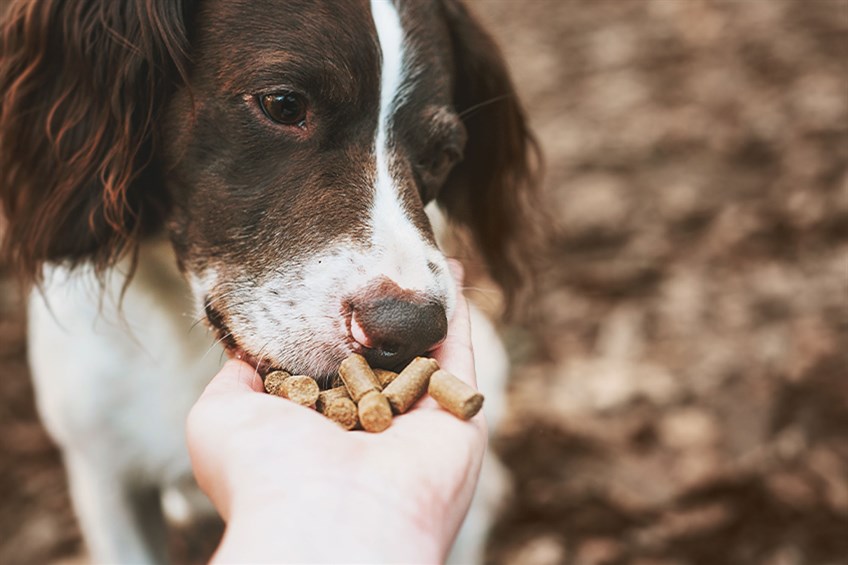HOW TO FEED MEALS ON YOUR DOG'S WALK
Published date: 25 November 2022

Did you know that dogs find 15 minutes of sniffing just as stimulating as a one-hour walk?
According to the Canine Olfaction Research and Education Laboratory at Texas Tech University, dogs sniff five to six times a second, and humans only sniff once every 1.5 seconds. Dogs’ noses have more than 200 million scent receptors, and humans only have a paltry six million!That’s why dogs love to sniff absolutely everything! Sniffing is how dogs read the world.
Studies have also shown that sniffing helps dogs feel more positive. When dogs sniff, they can make their own decisions and practice instinctively enriching behaviours. (Duranton and Horowitz. 2018). When out on walks with our dogs, scattering their meals for them to sniff out and eat is a superb way to stimulate them. Sniffing for food is challenging, and I choose sniffing as my favourite way of stimulating my dogs.
Should I scatter food randomly?
Don’t make this mistake! The trick to this exercise is not to scatter your dog’s food randomly. Scattering your dog’s food without intention has the opposite effect of what we want to achieve and distracts your dog from practicing other normal canine behaviours. Find a quiet place on your dog’s walk to take a beat for around 15 minutes and scatter your dog’s meals in that place whilst you observe them. Alternatively, you can, of course, use your own garden.
The great thing about sniffing for food, is it never gets easier, unlike physical exercise and training. This is because the mental effort required to organise and identify the different components of a smell is demanding and tiring work. Much like a human figuring out a tricky logic puzzle!
Give your Dog a Goal
Easy but stimulating tasks like scattering your dog’s meals on walks are an excellent way of adding purpose to their walks or their entire day. Life is about creating purpose; most pet dogs do not have one. This is why it sometimes seems like their 'goal’ in life is to obsess over other dogs, chase deer, and pick up poo, sticks or stones.
One way to consider this is to imagine giving a pack of wolves a week’s worth of food. They’d lose their purpose for that entire week. Wolves work for their food; food is their currency, and it’s the same for our dogs. Letting your dog find her food on walks is purposeful and stimulating, and it’s also completely normal.
This is why if you have an obsessive behavioural issue with your dog only in certain situations, it is worth asking yourself, does the dog have anything else to do that is reinforcing or stimulating? So many dogs have behavioural problems stemming from frustration and boredom. They do not sleep the recommended 18 to 20 hours a day and encouraging lots of sniffing is one of many things that can help support healthy sleep.
Can I find more help for obsessive behaviours?
To learn more about supporting dogs with obsessive behaviours, check out my site. There are online lessons designed to help owners improve their dogs mental health and reduce those problem behaviours.
Written by Max at MK9Plus
Find out more about MK9Plus, how to claim an exclusive 7 day free trial and get 30% off a MK9Plus subscription.
Read more blogs from Max here.


